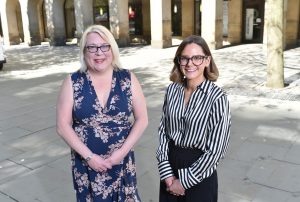Scale of Liverpool City Region’s efforts to rescue COVID-hit economy revealed

Accounts approved at the Liverpool City Region Combined Authority’s September meeting have revealed the scale of the rescue effort developed by local leaders to help save jobs and protect the city region’s economy as COVID hit.
The 2020/21 accounts reveal how, by the end of June 2021, more than £44m in emergency funding had been distributed to more than 4,000 businesses across the city region, through a number of schemes set up and delivered at high speed.
In addition to distributing this funding from the Additional Restrictions Grant scheme, which the Metro Mayor secured following negotiations with the Government when the city region was first put into Tier Three restrictions in October 2020, a number of other specific financial support measures were introduced:
- £5m to support businesses to access national government funds and improve the survival rate of LCR businesses
- Increased flexibility for local authorities to use the £6m Town Centres Fund to support local high street recovery
- £400,000 to support micro-businesses and SMEs in the cultural sector
- A £3m Future Innovation Fund Pilot programme to support Liverpool City Region’s small and medium-sized enterprise (SME) community, to incentivise them to innovate, adapt and diversify in response to the pandemic
The period also saw the Metro Mayor establish LCR Cares, a unique crowdfunding campaign to support community organisations that were working to support their neighbours through the pandemic.
Administered in partnership with the Community Foundation for Merseyside, LCR Cares raised more than £2.5m. The funding was immediately distributed to more than 300 local groups and charities providing services to communities during the pandemic, including food deliveries, activities for children, and provision of PPE to care homes.
In a joint statement, Liverpool City Region Metro Mayor Steve Rotheram, Cllr Mike Wharton, leader, Halton Borough Council, Cllr Graham Morgan, leader, Knowsley Borough Council, Joanne Anderson, Mayor of Liverpool, Cllr Ian Maher, leader, Sefton Borough Council, Cllr David Baines, leader, St Helens Borough Council and Cllr Janette Williamson, leader, Wirral Borough Council, said: “The coronavirus pandemic has been one of the biggest challenges any of us has faced in our lifetimes.
“It has not just been a medical crisis, but an economic one, too. As local leaders, we have done everything within our power to meet this challenge head on and do what is best for people living in our region.
“We have put together tens of millions of pounds of support to help keep the local economy afloat, protects as many businesses as possible, and save people’s lives and their livelihoods.
“We said throughout the crisis that we wouldn’t be able to rebuild if we didn’t have an economy to come back to. As these accounts show, our region is in a much stronger place than it would have been without our intervention.”
They added: “And we have begun that rebuild, following the launch of the Metro Mayor’s £150m COVID Recovery Fund – the largest package of business support the region has seen in a generation.
“Despite the difficulties of the past 18 months, there are reasons for optimism. Our characteristic resilience and solidarity has been on full display, and we are already getting to work on delivering our recovery plan, making our region greener, stronger and fit for the future.”
Initially targeted at hard hit hospitality and retail businesses, the grants were later made available to all businesses with a 40% cut in their sales or revenue.
The combined authority worked closely with the city region’s six local authorities, who have made sure the money has reached the businesses that needed it most, approving more than 28,000 applications for funding.
In August 2020, the combined authority published Build Back Better, an ambitious economic recovery plan for the whole of the city region, supported by leading figures from the worlds of business, academia, the social economy, the public sector and trades unions.
The plan, submitted to central government, set out how £1.4bn in investment could unlock £8.8bn of projects to begin in the next 12 months, creating 94,000 permanent jobs, with a further 28,000 jobs in construction.








